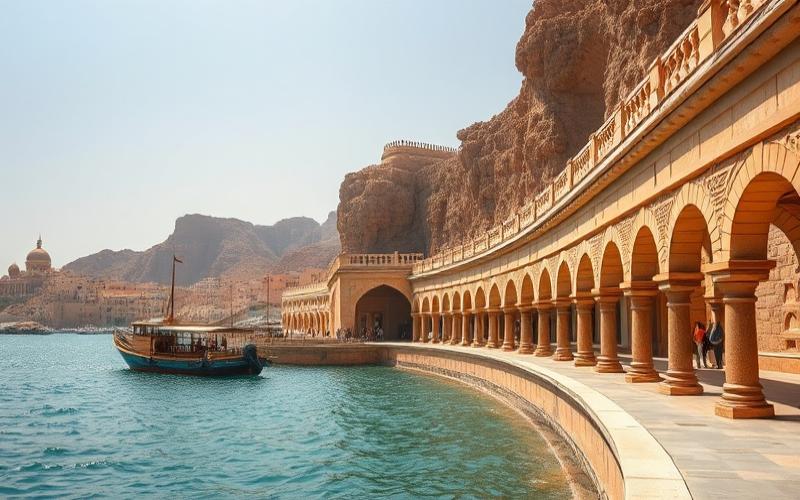
 Published on and written by Cyril Jarnias
Published on and written by Cyril Jarnias
Oman, a Middle Eastern country located on the southeastern coast of the Arabian Peninsula, offers numerous opportunities for foreign investors. However, as in many countries in the region, there are specific regulations regarding foreign ownership. This article will guide you through the essential aspects of real estate investment in Oman for non-residents.
The Legal Framework: Between Openness and Control
The Sultanate of Oman has significantly relaxed its foreign ownership laws in recent years, as part of its economic diversification strategy and to attract foreign direct investment. However, certain restrictions remain in place to preserve national interests.
Permitted Areas for Foreign Investment
Foreigners are allowed to purchase real estate in specifically designated areas, called “Integrated Tourism Complexes” (ITCs). These zones were created to promote high-end tourism and residential development. Among the most well-known ITCs are:
- The Wave, Muscat
- Muscat Hills
- Jebel Sifah
- Al Mouj
- Hawana Salalah
In these areas, foreigners can acquire properties with full ownership rights, similar to those of Omani citizens.
Restrictions Outside Designated Areas
Outside ITCs, the purchase of real estate by foreigners is generally limited. Non-Omanis cannot buy land or properties in most residential or commercial areas of the country. However, there are exceptions for certain government-approved development projects.
Good to Know:
Foreign companies operating in Oman can lease land for their business activities, even if they cannot purchase it directly.
The Approval Process: A Regulated Procedure
Acquiring real estate by a foreigner in Oman requires following a rigorous approval process. Here are the main steps to follow:
1. Property Identification
Begin by identifying a property in a permitted area (ITC). It is recommended to work with a licensed real estate agent who is familiar with local regulations.
2. Eligibility Verification
Ensure that the chosen property is indeed available for purchase by foreigners. Some properties within ITCs may be reserved for Omani citizens.
3. Approval Application
Submit an approval application to the Ministry of Housing and Urban Planning. This application must include:
- A copy of your passport
- Detailed information about the property
- Proof of financial solvency
- A clean criminal record certificate
4. Application Review
The authorities will review your application, which may take several weeks. They will particularly verify that the purchase does not pose a national security issue.
5. Obtaining Approval
Once approval is obtained, you can proceed with the property purchase. Registration is done with the Ministry of Housing and Urban Planning.
Good to Know:
The approval process can take between 2 and 4 months. It is crucial to be patient and follow the procedures meticulously to avoid any delays.
Rights and Responsibilities: What You Need to Know
Once you own real estate in Oman, you benefit from certain rights but must also comply with specific obligations.
Rights of Foreign Owners
- Full Ownership: In permitted areas, you hold full ownership of the property.
- Right to Resell: You can resell your property to another foreigner or an Omani citizen.
- Inheritance: The property can be passed on to your heirs according to Omani laws.
- Residence Visa: Purchasing a property valued over 250,000 Omani rials (approximately $650,000) entitles you to a renewable residence visa.
Obligations to Respect
- Compliance with Local Laws: You must adhere to all Omani laws and regulations concerning real estate ownership.
- Tax Payments: Although Oman does not impose an annual property tax, you will need to pay registration fees upon purchase (approximately 3% of the property value).
- Property Maintenance: You are responsible for maintaining your property in accordance with local standards.
- Usage Restrictions: Property use must comply with zoning rules and specific ITC restrictions.
Good to Know:
Foreign owners generally benefit from the same legal protections as Omani citizens regarding real estate. However, it is always recommended to consult a local lawyer to fully understand your rights and obligations.
Expert Tips for a Successful Investment
Investing in real estate in Oman can be a rewarding experience, but certain precautions should be taken. Here are some tips to maximize your chances of success:
1. Do Your Research
Before committing, thoroughly study the Omani real estate market. Understand price trends, developing areas, and the country’s economic outlook.
2. Work with Local Professionals
Hire a reputable real estate agent and a lawyer specializing in international real estate transactions. Their local expertise will be invaluable in navigating market complexities.
3. Visit in Person
If possible, visit Oman and the properties you’re interested in before purchasing. This will give you a better understanding of the environment and property quality.
4. Understand Tax Implications
Consult a tax advisor to understand the tax implications of your investment, both in your home country and in Oman.
5. Consider the Long Term
Real estate investment in Oman should be considered for the long term. Markets may fluctuate, but the country’s political and economic stability makes it an attractive destination for patient investors.
6. Diversify Your Investments
Don’t put all your eggs in one basket. Consider real estate investment in Oman as part of your overall investment portfolio.
7. Stay Informed About Regulatory Changes
Foreign ownership laws may evolve. Stay informed about potential changes that could affect your investment.
Good to Know:
Oman is known for its political and economic stability in the region, making it an attractive destination for foreign investors seeking to diversify their real estate portfolio in the Middle East.
In conclusion, investing in real estate in Oman offers interesting opportunities for foreign investors, despite certain restrictions. With a thorough understanding of regulations, proper due diligence, and professional advice, you can successfully navigate the Omani real estate market. The combination of an evolving legal framework, a diversified economy, and a developing real estate market makes Oman a destination to seriously consider for international real estate investors.
Disclaimer: The information provided on this website is for informational purposes only and does not constitute financial, legal, or professional advice. We encourage you to consult qualified experts before making any investment, real estate, or expatriation decisions. Although we strive to maintain up-to-date and accurate information, we do not guarantee the completeness, accuracy, or timeliness of the proposed content. As investment and expatriation involve risks, we disclaim any liability for potential losses or damages arising from the use of this site. Your use of this site confirms your acceptance of these terms and your understanding of the associated risks.



















